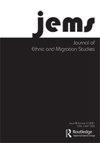出国留学与否,为什么?探索中国大学生的研究生意向
IF 2.8
1区 社会学
Q1 DEMOGRAPHY
引用次数: 5
摘要
【摘要】自1991年以来,中国每年出国留学人数急剧增加,2019年达到70.35万人的峰值。这项研究利用2018年在中国西南城市两所主要大学收集的大学生调查数据,探讨了他们是谁以及他们为什么打算出国留学。通过双变量分析和多项逻辑回归分析来检验影响他们出国留学意愿的家庭和个人因素,然后通过非参数测试来确定促使他们出国留学或抑制他们出国留学意愿的主要原因。研究发现,尽管经济资本对中国大学生出国留学意愿的影响显著,但家庭和个人层面的智力资本对中国大学生出国留学意愿的影响最大。此外,能够积累/提升智力资本是他们考虑出国留学和选择目的地的主要原因,而缺乏足够的经济支持是他们追求国际教育的直接阻碍。此外,性别差异对留学意向也有影响。关键词:中国学生研究生留学意向智力资本披露声明作者未发现潜在利益冲突。注1这个数字可以在http://www.moe.gov.cn/jyb_xwfb/gzdt_gzdt/s5987/202012/t20201214_505447.html2上检索到智力边缘,智力门户和智力笔记,在本期特刊的介绍部分进行了概念化(Li, Lo, and Lu, Citation2023)。“211工程”和“985工程”是中国在20世纪90年代启动的国家项目,旨在资助选定的大学提高其研究能力和国际声誉。“双一流”计划于2017年启动,延续了之前的两个项目,旨在打造世界一流的大学和学科在中国,高中录取学生的类型在一定程度上反映了他们的教育成绩和家庭经济状况。进入重点公立学校,有时甚至是著名的私立学校就读,表明学业成绩优异;就读国际/私立学校也意味着富裕的家庭背景;而非重点公立学校的学生则表现出较少的教育和/或经济优势中国人才政策是一个总称,包括旨在吸引所需海外人才到中国的政策,特别是从西方大学获得研究生学位的中国学生(苗等)。除非另有说明,文本中报告的所有OR值在0.05或0.01或0.001水平上均具有显著性部分段落没有引用or,因为虽然得出的结论相同,但不同模型的or值不同,描述了总体趋势,or见表2.8根据不同的调查数据和官方统计,美国多年来一直是中国留学生的首选目的地,而加拿大很可能排在第3至第5位(如Colson Citation2016;Statista Citation2022)。本研究项目由美国国家科学基金(BCS-1660526)、加拿大社会科学与人文研究理事会(435-2017-1168)和中国国家社会科学基金(21BJL097)资助。本文章由计算机程序翻译,如有差异,请以英文原文为准。
To study abroad or not, and why? Exploring Chinese university students’ postgraduate intentions
ABSTRACTSince 1991, the annual population of Chinese students studying abroad has increased dramatically, peaking at 703,500 in 2019. This study explores who they are and why they intend to study abroad, using university student survey data collected in 2018 from two major universities in a southwestern city in China. Bivariate analysis and multinomial logistical regression analysis were conducted to examine the family and personal factors influencing their intentions to study abroad, followed by non-parametric tests for identifying the primary reasons motivating them to study abroad or inhibiting such intention. It was found that although economic capital shows significant influence, intellectual capital, at both family and personal levels, has the strongest effect on Chinese university students’ intentions to study abroad. Furthermore, being able to accumulate/upgrade intellectual capital is the primary reason for them to consider studying abroad and selecting the destination, whereas the lack of sufficient financial support is a direct deterrent on pursuing international education. Additionally, gender difference matters on intention to study abroad.KEYWORDS: Chinese studentspostgraduate intentionstudy abroadintellectual capital Disclosure statementNo potential conflict of interest was reported by the author(s).Notes1 The number can be retrieved at http://www.moe.gov.cn/jyb_xwfb/gzdt_gzdt/s5987/202012/t20201214_505447.html2 Intellectual Periphery, Intellectual Gateway and Intellectual Note, are conceptualised in the introduction piece of this special issue (Li, Lo, and Lu, Citation2023).3 ‘Project 211’ and ‘Project 985’ are national projects of China, launched in the 1990s, to fund selected universities to raise their research capacities and international reputations. The ‘double-first-class’ initiative was launched in 2017 to renew the two previous projects, aiming to create world-class universities and disciplines.4 In China, the type of high school students enrolled partially indicates their educational performance and family economic status. Enrolling at key public schools and sometimes prestigious private schools indicates high academic performance; enrolling at international/private schools also implicates well-off family background; while non-key public school students show less educational and/or economic advantages.5 China talent policy is an umbrella term to bracket policies designed to attract the desired talent overseas to China, especially Chinese students with graduate degrees from western universities (Miao, et al. Citation2022)6 All OR values reported in text are significant at the level of .05 or .01 or .001, unless otherwise stated.7 ORs are not cited in some paragraphs, because its values vary between models despite providing same conclusion, general trend is described, and ORs can be found in Table 2.8 According to different survey data and official statistics, the US has been the number one destination for Chinese students for years, while Canada is likely to be ranked at the 3rd to 5th place (e.g. Colson Citation2016; Statista Citation2022).Additional informationFundingA grant from a US National Science Foundation grant (BCS-1660526), a Social Sciences and Humanities Research Council of Canada grant (435-2017-1168), and a grant from the National Social Science Fund of China (21BJL097) funded the research project that this article is based upon.
求助全文
通过发布文献求助,成功后即可免费获取论文全文。
去求助
来源期刊

Journal of Ethnic and Migration Studies
Multiple-
CiteScore
7.80
自引率
9.10%
发文量
157
期刊介绍:
The Journal of Ethnic and Migration Studies (JEMS) publishes the results of first-class research on all forms of migration and its consequences, together with articles on ethnic conflict, discrimination, racism, nationalism, citizenship and policies of integration. Contributions to the journal, which are all fully refereed, are especially welcome when they are the result of original empirical research that makes a clear contribution to the field of migration JEMS has a long-standing interest in informed policy debate and contributions are welcomed which seek to develop the implications of research for policy innovation, or which evaluate the results of previous initiatives. The journal is also interested in publishing the results of theoretical work.
 求助内容:
求助内容: 应助结果提醒方式:
应助结果提醒方式:


